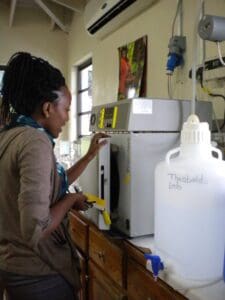Propagation and Tissue Culture Labs—in Guyana and Beyond
By: Priorclave
Category: Lab Innovation

Over the past decade plant tissue culture has been among the primary focuses of biotechnology in Guyana. This has largely been led by the National Agricultural Research and Extension Institute (NAREI). Some of these projects have strict conservation goals, establishing depositories of viable genetic samples from threatened species. But the primary focus has been on increasing yields and improving food security in Guyana and throughout the region. In the 21st Century, that hinges on developing laboratory protocols for in-vitro micropropagation and storage of important crops (like cassava, pineapple, yams, sweet potato, and plantain) to facilitate cross-border transfer of genetic material and the distribution of high-yield or disease-resistant varieties to farmers.

Laboratory worker with their benchtop Priorclave autoclave (WASCO, St. Lucia)
Priorclave has experience supplying autoclaves to labs working on tissue culture projects, working with the Huntington’s Botanical Conservation Program. Through this program, the Huntington maintains an active seed bank and tissue culture lab, which serve as a complementary repository to the living plant collections at their 200-acre conservation-focused botanical gardens. Their tissue culture program primarily serves as an on-site propagation tool for species that are otherwise difficult or slow to propagate. Through this program the Huntington also collaborates globally with other groups and organisations to establish new plant tissue culture and cryopreservation protocols. Their goal is to create and disseminate reusable protocols, training botanists internationally.
How the Wrong Autoclave Stymies Progress
In most biotech labs—and especially those focusing on agriculture and botany—the major bottleneck has always been qualified staff. As such, anything that wastes staff time is a critical issue that needs to be addressed. And in many labs, the autoclave is the number-one source of lost productive hours. An incorrectly specced autoclave will often be unnecessarily slow to heat and cool or lack key programming or usability features that are important to efficient lab operation.
This was certainly the case at the Huntington’s tissue culture lab. Due to a procurement error, their lab had been outfitted with a large steam-jacketed autoclave that relied on an external steam generator. This style of autoclave is intended for high-throughput hospital use in North America. As a result, they are expensive and resource intensive. They take up a lot of lab space and are extremely costly to operate and maintain on an ongoing basis. Additionally, their complexity leads to frequent interruptions for repair. (And those repairs can be expensive, as the units have very few user-serviceable components or systems and often must be serviced only by factory-certified technicians.)
But what really bothered Huntington was how slow their autoclave was. Because of its size, it took a long time to build up sufficient steam to start a cycle and then a long time to cool enough to be safely opened. Media preparation, waste loads, and other sterilisation tasks had to be carefully scheduled to make sure everyone had what they needed when they needed it.
Reliability and Support: Priorclaves are the Right Size for Tissue Culture Labs
After a decade of struggling with a poorly chosen autoclave, the Huntington contacted Priorclave. They ultimately replaced their existing autoclave with a front-loading 100L Priorclave with in-chamber electric heating. This was a smaller unit, in terms of footprint, but still more than ample to their tasks. Priorclaves in general are built for robust reliability and easy service, with many user-serviceable parts and systems. On top of that, Priorclave guarantees every unit sold with lifetime 24/7 technical support to guide owners on routine maintenance and troubleshooting. This combination of reliability and support greatly reduced out-of-service periods for the Huntington, and largely eliminated unscheduled maintenance outages.
Most importantly, because their autoclave was right-sized to their applications, it ran cycles more quickly, reducing scheduling strain in the lab and downtime wasted waiting for supplies to be ready.
Do you need to improve your lab’s efficiency? Reach out to discuss what Priorclave can do to help your work go more smoothly.

